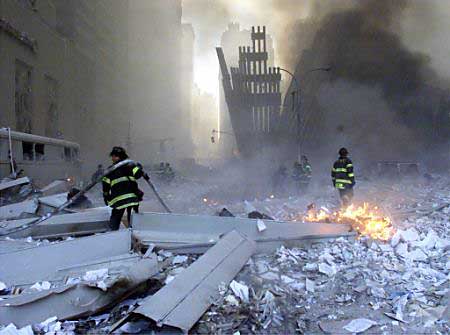 |
| AP Photo Nasser Nasser |
Did the US Embassy in Cairo (part of the "Obama
Administration" according to Romney) issue an "apology"?
According to Politifact.com (and just about anyone who read the statement) it
was nothing of the sort. It did what our politicians should have done:
distancing the American government from the anti-Islam film that was the cause
of the protests. While people have the right to say abhorrent things -it's called free speech - we need not endorse
the views of the hatred-mongers.
The film seems to follow a familiar pattern. If you have
been paying attention recently, a veritable industry of anti-Islamic propaganda
has been creeping into the media and public discourse. Much of this seems to be
driven by right-wing Christians who view Islam as a religious threat and are
selling it as a threat to American values. Think not just of Pastor Terry
Jones, but Ayaan Hirsi Ali and numerous less visible others who promote
anti-Islam through books, articles, TV shows, movies, wherever they can. Lest
we forget that people actually read/listen to this stuff, recall Michelle
Bachman's specious claims that the Muslim Brotherhood (not a terrorist group)
was infiltrating the US State Department. According to US News and WorldReport:
But all signs point to the likelihood that Bachmann didn't develop these ideas on her own.
Rather, it looks to be the brain child of Frank Gaffney, the president of the American Center for Security Policy, a nonprofit that received $4,084,750 in contributions in 2010 to educate Americans on the "Shariah threat."
Why don't we call out these hate-mongers? They have the
right to spew hate, just like anyone else, but it is our responsibility to
point it out as what it is: hate speech not representative of the American
people. When racists burn crosses, for example, and spew racist bigotry,
responsible people distance themselves from it.
Recall after 9/11, officials from all sides of the political
spectrum called upon Muslims to disavow violence and distance themselves from
extremists. Can we not return the favor?
So while Mitt Romney and Republicans in general like to makepolitical hay out of Obama's supposed "apologies" for America, we
continue to shoot ourselves in the foot. Not only should we condemn hate speech
(even while freedom of speech allows it), we should be aware of the message we
are sending with our disgust for "apologies."
Putting aside the fact
that most of these supposed apologies were nothing of the sort, does Mitt not
realize that an unapologetic hegemon is hated everywhere. That is exactly where
this anti-American sentiment is coming from. We tell others what to do, when to
do it, and don't even pretend to understand others' cultures or points of view.
If that is what makes American great in the eyes of Republicans, then they
obviously don't want allies by our side. And when we need allies to work with
us in identifying those people who may truly be threats, I don't want us to
find ourselves alone.






